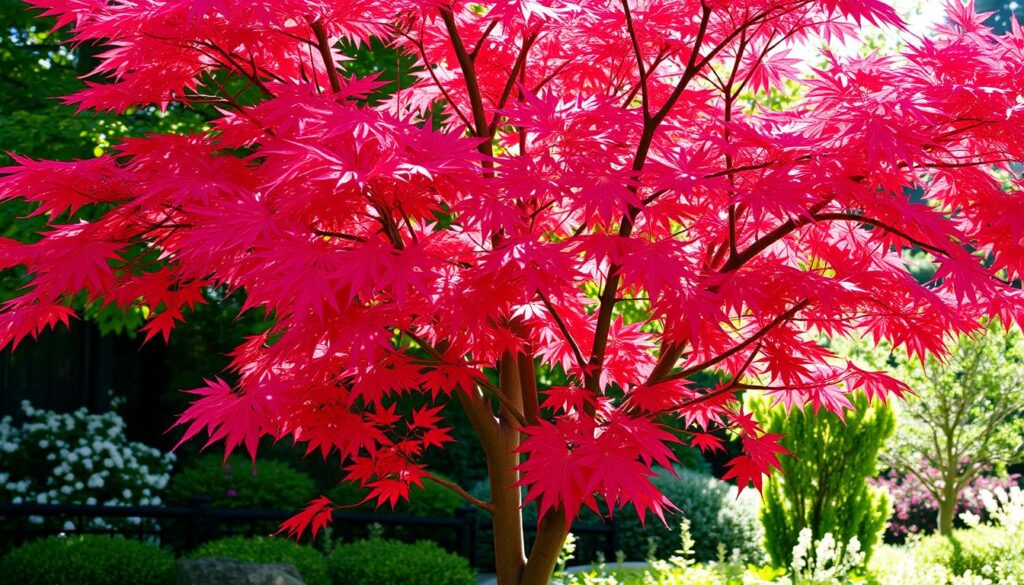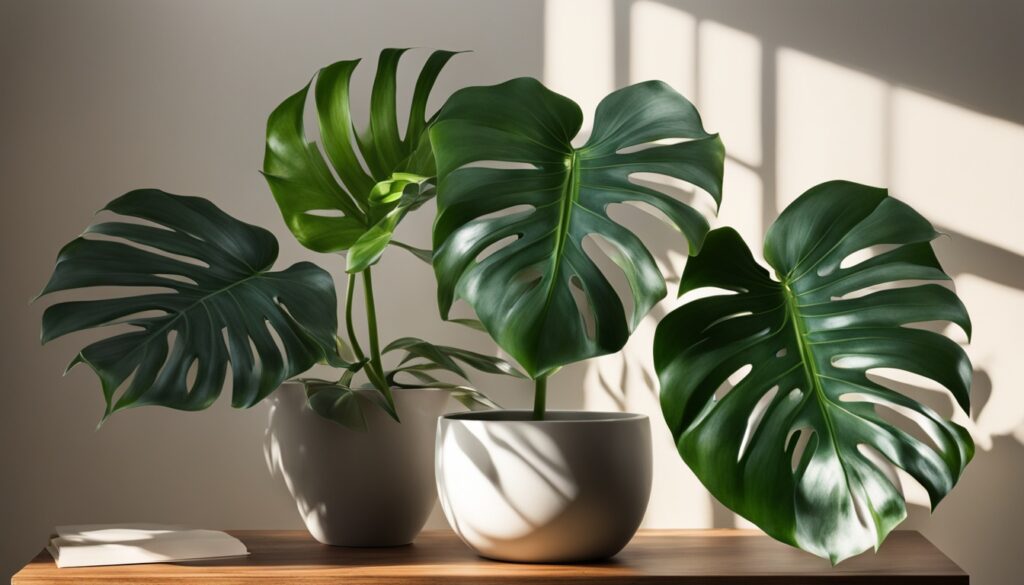Imagine having a Japanese garden right at your home. The Deshojo maple brings this beauty to life. It’s a Japanese tree with leaves that change colors with the seasons. This tree, known as Acer palmatum ‘Deshojo’, has vibrant red leaves that turn into a rainbow of colors.
Key Takeaways
- The Deshojo maple is a captivating Japanese tree with stunning foliage that changes colors throughout the seasons.
- This one-of-a-kind Japanese maple, Acer palmatum ‘Deshojo’, is prized for its exceptional ornamental value and cultural significance.
- The Deshojo maple is imported and cutting-grown, not grafted, ensuring a unique and authentic representation of this sought-after variety.
- With its vibrant red spring foliage and fiery red fall colors, the Deshojo maple adds a splash of color to any garden or landscape.
- Renowned as a bonsai classic, the Deshojo maple’s delicate palm-shaped leaves and compact growth habit make it a treasured choice for enthusiasts.
Introducing the Deshojo Maple
The Deshojo maple is a rare and beautiful variety of the Japanese maple (Acer palmatum). It’s loved by gardeners and bonsai fans. These trees are grown from cuttings, making them more true to the bonsai maple type.
One-Of-A-Kind Japanese Maple ‘Deshojo’
The Deshojo maple has stunning red leaves in spring and turns fiery in fall. As they grow, they become stunning trees, showing off their special traits.
Imported and Cutting-Grown, Not Grafted
The Deshojo maple is not grafted but grown from cuttings. This way, it keeps its natural growth and looks, making it unique.
“The Deshojo maple is a true masterpiece of nature, capturing the essence of the Japanese maple with its vibrant red foliage and captivating growth habits.”
| Propagation Method | Success Rate |
|---|---|
| Air Layering | Weeks to months for roots to form |
| Stem Cuttings | Varying success rates compared to air layering |
For the Deshojo maple to thrive, it needs the right care. Things like rooting hormone usage, moisture control, and post-propagation care are key to its health and growth.
The Deshojo Maple’s Vibrant Colors
The Deshojo maple is famous for its amazing leaves that change with the seasons. In spring, its leaves start as a bright, vivid red. This is truly amazing.
As the year goes on, the deshojo maple leaves turn a fiery red in the autumn foliage. This makes it the main attraction in any landscape design.
Bright Red Spring Foliage
The new leaves of the Deshojo maple show off in a stunning crimson red. This creates a striking contrast with the green around it. It’s a joy to see.
Fiery Red Fall Colors
When summer turns to autumn, the Deshojo maple changes again. Its leaves turn from green to a fiery red. This lights up the landscape with its bold colors.
This maple tree care is key to keeping the tree healthy. It makes sure the tree looks great in the fall.
The Deshojo maple’s colors are a highlight in any landscape design. Whether it’s the bright red in spring or the fiery red in autumn, it makes a lasting impression.
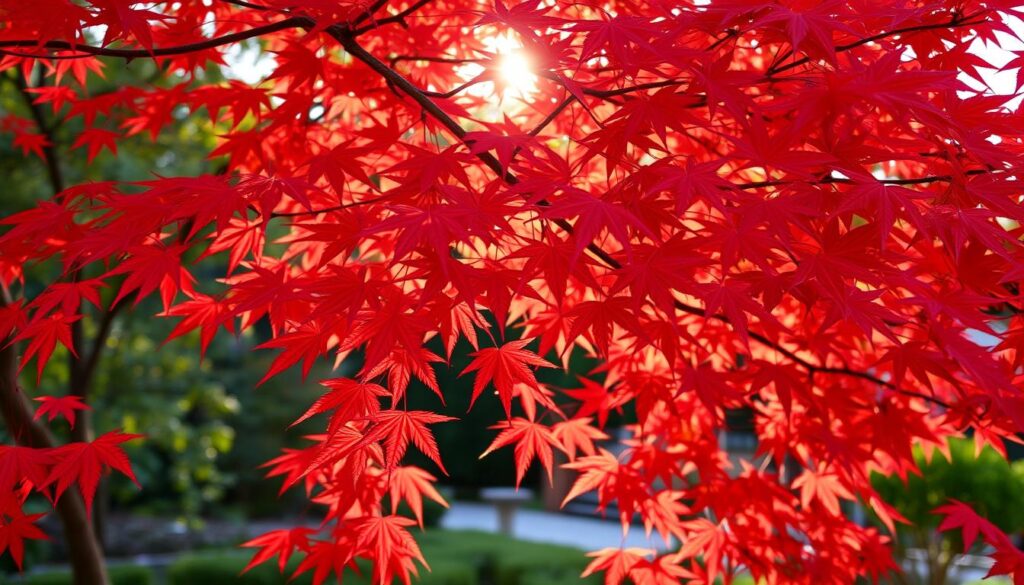
A Bonsai Classic
Japanese maples, like the Deshojo variety, are a true bonsai classic. They are loved for their compact size, delicate leaves, and beauty. This makes them a favorite among bonsai fans and collectors.
Japanese maple bonsai trees are truly stunning. They are even more beautiful than full-size Japanese maples. These trees come in many colors, such as red, orange, green, and purple. They also have different shapes and sizes, making them perfect for bonsai art.
| Cultivar | Characteristics |
|---|---|
| ‘Deshojo’ | Intensely bright red leaves during autumn, contributing to its immense popularity |
| ‘Goshiki Kotohime’ | Multicolored foliage in shades of green, pink, and red |
| ‘Katsura’ | Golden-yellow fall color with a delicate, lace-like leaf shape |
| ‘Murasaki Kiyohime’ | Purple-red leaves that mature to a deep green color |
| ‘Beni Otake’ | Upright growth habit and crimson-red leaves that deepen in color throughout the season |
The Deshojo maple stands out for its bright red leaves in autumn. This makes it very popular among bonsai lovers. With proper care, these bonsai maple trees can flourish in japanese-style gardens. They bring color and elegance to any outdoor area.
Deshojo Maple: A Treasured Bonsai Choice
The Deshojo maple is a favorite among bonsai lovers. It’s known for its bright red leaves and deep cultural meaning. This makes it a prized pick for those who love Japanese-style gardens.
Stunning and Unique Representation of Bonsai Art
The Deshojo maple stands out with its small size and vibrant red leaves. These change from bright crimson in spring to fiery colors in fall. Its compact growth and delicate leaves add to its beauty, drawing fans worldwide.
Cultural Significance and Popularity
The Deshojo maple is loved for its role in Japanese gardening. It’s a key part of bonsai art, which is highly valued in Japan. This makes it a cherished piece for bonsai fans.
“The Deshojo maple’s captivating appearance and deep-rooted connection to Japanese-style gardens make it a revered addition to any bonsai collection.”
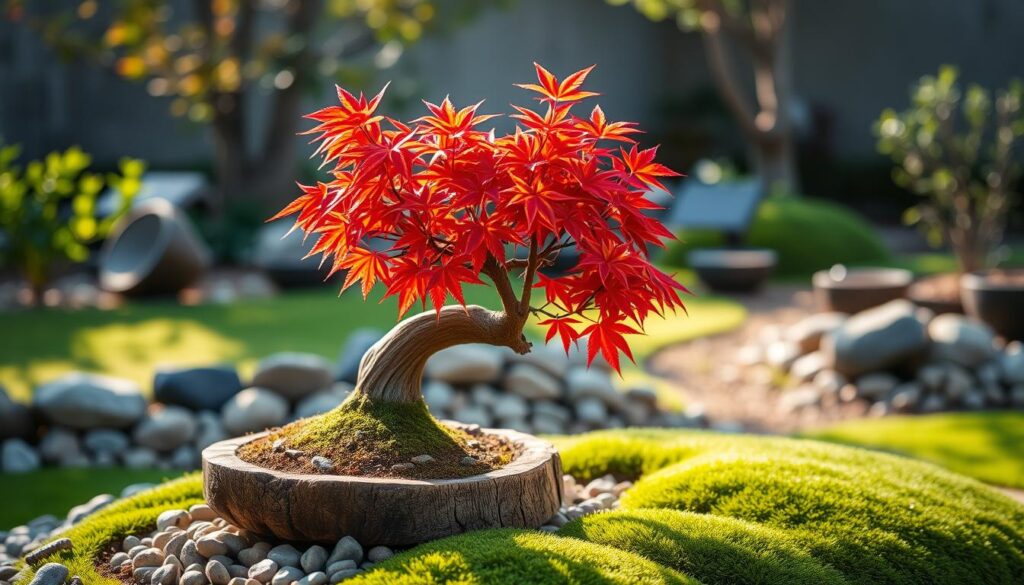
The Deshojo maple’s special traits and cultural importance have boosted its popularity. It’s a true treasure in the bonsai world.
Ideal for Adding a Splash of Color
The Deshojo maple is perfect for adding vibrant color to gardens or landscapes. Its beautiful foliage and easy care make it a favorite among gardeners. It looks great planted in the ground or in containers, adding beauty to any outdoor space.
Fantastic Color and Ease of Care
The Deshojo maple is famous for its stunning red leaves. These leaves turn reddish-green in summer and brilliant red in autumn. This color change, along with its low maintenance, makes it perfect for landscape design and container gardening.
With the right care, the Deshojo maple can thrive in many settings. It brings a touch of Japanese elegance to any outdoor area.
“The Deshojo maple’s vibrant autumn foliage is a true showstopper, making it a must-have for any garden enthusiast seeking to add a unique and captivating element to their landscape.”
- Deshojo maple is known for its striking red leaves that transition to a reddish-green hue in summer and back to brilliant red in autumn.
- Plain Acer palmatum bonsai is less expensive compared to other varieties on the list.
- The atropurpureum Japanese maple is slower-growing and requires more shade compared to plain Japanese maple.
- Kiyohime maple is ideal for bonsai enthusiasts looking for a dwarf cultivar with smaller leaves and lateral growth.
- Arakawa maple has a rugged appearance due to its rough bark and is considered a unique choice for bonsai with distinctive character.
- ‘Katsura’ cultivar is sought after for its vibrant yellow or orange leaves transitioning to green and back to orange in fall.
Deshojo Maple Care and Cultivation
The Deshojo maple is a beautiful Japanese maple variety. It loves partial shade and well-drained soil. This tree is great for adding elegance to your garden with little care.
By following a few easy steps, your Deshojo maple will grow well. It’s perfect for both urban gardens and container gardens.
Partial Shade and Well-Drained Soil
Deshojo maples need partial shade to avoid sunburn. Make sure the soil drains well to avoid root rot. A mix of akadama, pumice, and lava rock is best for their growth.
Low Maintenance Needs
The Deshojo maple is easy to care for. It needs proper watering, fertilization, and pruning. Keep the soil moist but not too wet.
Feed it with a balanced fertilizer during the growing season. Trim new shoots in early summer to keep its shape and promote growth.
Watch out for pests like aphids and spider mites, especially in the UK. In winter, protect it from frost and reduce watering to prevent root rot.
Every Deshojo maple is different. So, watch it closely and adjust your care as needed. This will help it thrive.
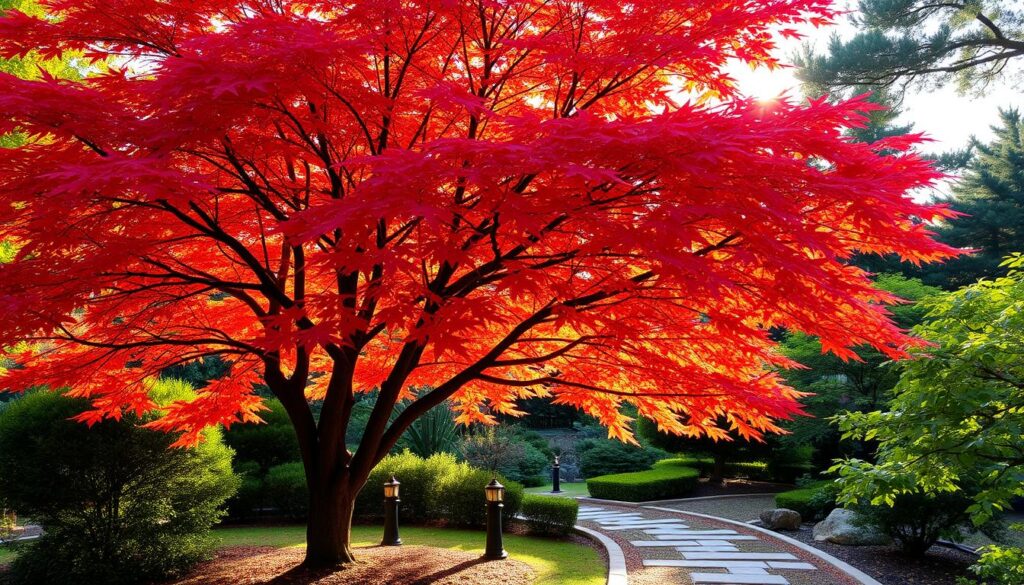
Versatile Landscaping Options
The Deshojo maple is great for many landscaping needs. It grows well in different places, making it perfect for japanese-style gardens and small spaces.
Japanese-Style Gardens
Looking to make a Japanese-style garden? The Deshojo maple is a great pick. Its bright leaves and palm-shaped leaves add a Japanese touch. It’s small and fits well in many garden designs.
Urban and Small Spaces
The Deshojo maple is perfect for small areas. It fits well in courtyards, balconies, or small backyards. Its size and beauty make it a great choice for small spaces.
| Japanese Maple Variety | Mature Size (Height x Width) | Sun Exposure | Seasonal Color |
|---|---|---|---|
| BloodGood | 12-15 ft x 10-12 ft | Partial Sun | Red spring, burgundy summer, crimson-red fall |
| Crimson Queen | 6-8 ft x 6-8 ft | Partial Shade | Fiery red spring, deep burgundy summer, scarlet fall |
| Shaina | 4-6 ft x 4-6 ft | Partial Sun | Bright red spring, green summer, scarlet fall |
| Waterfall | 8-10 ft x 8-10 ft | Morning Sun | Salmon-red spring, green summer, orange-scarlet fall |
“The versatility of garden maples ensures that there’s a suitable variety for every garden size and preference.”
Compact and Ornamental Growth Habit
The deshojo maple stands out with its compact and ornamental growth. It’s a beautiful addition to any garden or landscape design. Its size and delicate leaves make it a focal point or a great companion to other ornamental trees.
Dwarf Japanese maples like the deshojo maple grow up to 6-10 feet tall. They spread out equally, fitting well in small spaces. They grow slowly, adding 6-12 inches each year. This slow growth helps them stay compact and easy to care for.
| Variety | Height | Width | Hardiness Zones |
|---|---|---|---|
| Velvet Viking™ Japanese Maple | Up to 3 feet | Up to 8 feet | Zones 4-9 |
| Crimson Queen Japanese Maple | Up to 10 feet | Up to 10 feet | Zones 5-8 |
| Waterfall Japanese Maple | Up to 10 feet | Up to 12 feet | Zones 5-8 |
| Shin Deshojo Japanese Maple | Up to 9 feet | Up to 9 feet | Zones 5-8 |
| Shaina Japanese Maple | Up to 8 feet | Up to 10 feet | Zones 5-8 |
| Tamukeyama Japanese Maple | Up to 10 feet | Up to 12 feet | Zones 5-8 |
| Rhode Island Red Japanese Maple | Up to 6 feet | Up to 6 feet | Zones 5-9 |
| Red Dragon Japanese Maple | Up to 8 feet | Up to 5 feet | Zones 5-8 |
| Kagiri Nishiki Japanese Maple | Up to 8 feet | Up to 4 feet | Zones 5-8 |
| Viridis Japanese Maple | Up to 10 feet | Up to 8 feet | Zones 5-8 |
The deshojo maple’s small size and beautiful leaves make it perfect for landscape design. It does well in small urban areas or big Japanese-style gardens.
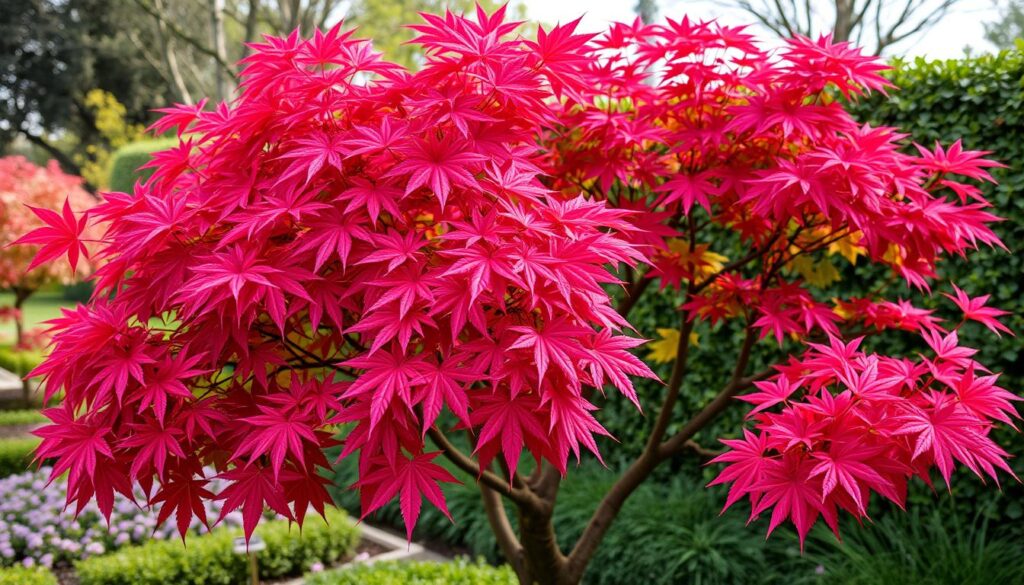
“The deshojo maple’s compact size and delicate foliage make it a standout addition to any garden or landscape, adding a touch of elegance and vibrant color.”
Delicate Palm-Shaped Leaves
The Deshojo maple is famous for its delicate, palm-shaped leaves. These leaves add elegance to the tree. They are perfect for Japanese-style garden designs and other landscaping needs.
The leaves of the Deshojo maple are intricate and hand-like. This makes them highly valued by fans of deshojo maple, ornamental trees, and japanese-style gardens. Their delicate nature brings elegance and grace to the tree’s look.
“The Deshojo maple’s palm-shaped leaves are a true testament to the beauty and artistry of nature. Their delicate, intricate form adds a level of refinement that is simply unparalleled.”
The Deshojo’s leaves are also vibrant, making the tree great for landscaping. They work well in both traditional japanese-style gardens and modern outdoor spaces. The tree’s leaves are sure to impress, whether it’s alone or part of a bigger design.
In summary, the Deshojo maple’s leaves are a key feature that makes the tree beautiful and versatile. Adding this ornamental tree to your landscape brings stunning foliage and many benefits. It’s perfect for creating a beautiful, japanese-style garden aesthetic.
Sourcing and Availability
The Deshojo maple is a highly sought-after variety. It may be hard to find in some areas. When looking for this Japanese tree, it’s important to consider shipping guidelines and other factors. This ensures the tree arrives healthy and thriving.
Shipping Considerations for the Deshojo Maple
Shipping the Deshojo maple needs careful planning. It’s vital to check if your area allows receiving this delicate plant. Also, knowing the seller’s warranty and return policies is crucial.
Proper packing and handling are key to the Deshojo maple’s survival. Sellers like Essence of the Tree have the experience to ensure safe arrival.
| Pot Size | Price | Availability |
|---|---|---|
| 10″ pot | $99.99 | Out of stock |
| 12″ pot | $179.99 | Out of stock |
| Standard 12″ pot | $139.99 | Out of stock |
| 13″ pot | $199.99 | Out of stock |
| 16″ pot | $329.99 | Out of stock |
| 20″ pot | $499.99 | Out of stock |
| 90L pot | $599.99 | Available |
As the Deshojo maple’s popularity grows, availability may change. It’s wise to look at multiple reliable sources. This way, you can stay updated on the latest stock and shipping options. This increases your chances of getting this beautiful Japanese tree.
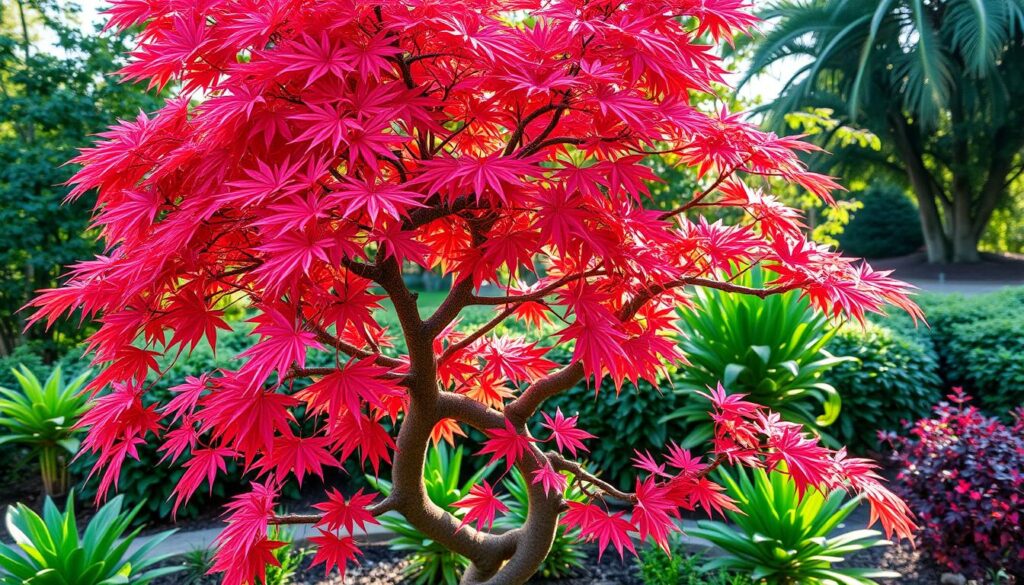
Buyer Responsibilities and Warranties
Buying a rare Deshojo maple comes with big responsibilities. This Japanese maple is a pricey bonsai that needs your care. You must provide the right maple tree care and container gardening to keep it healthy.
As the buyer, you’re in charge of the tree’s needs. The seller won’t provide any warranties after you buy it. You must follow the care guidelines to keep your Deshojo maple happy and healthy.
- Provide partial shade and well-drained soil for optimal growth
- Maintain a consistent watering schedule, avoiding over or under-watering
- Monitor the tree’s health closely and address any issues promptly
- Protect the Deshojo maple from extreme weather conditions or pests
- Commit to the long-term care and cultivation of this delicate bonsai specimen
By understanding and embracing these buyer responsibilities, you’ll enjoy your Deshojo maple’s beauty for years. The seller’s job ends when they ship the tree. Now, it’s your turn to make sure it thrives in your garden or bonsai collection.
Conclusion
The Deshojo Japanese maple is a stunning tree that changes colors with the seasons. It starts with bright red leaves in spring and ends with fiery autumn colors. This tree is perfect for gardens, landscapes, and bonsai collections.
Its compact size and delicate leaves make it a favorite. It also holds deep cultural value. This makes it a great choice for adding elegance and beauty to your outdoor space.
The Deshojo maple stands out in any garden or small urban setting. It’s known for its beauty and adaptability. It thrives in partial shade and well-drained soil, making it easy to care for.
When adding a Deshojo maple to your landscape, make sure it gets the right light. Protect its leaves from too much sun. Also, watch out for pests. With the right care, this tree will bring color and beauty to your space.
